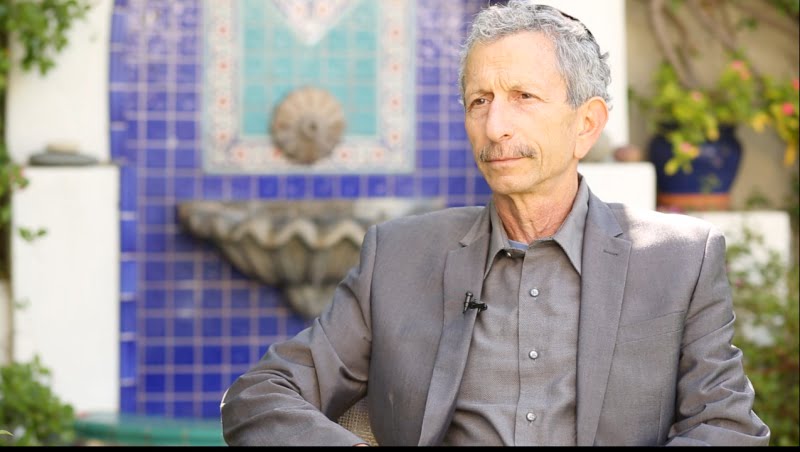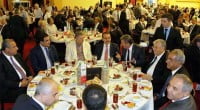My Meeting With Fethullah Gülen, the Man Accused of Plotting Turkey’s Coup

Date posted: January 17, 2017
Reuven Firestone
Last month, I met with Fethullah Gülen, “the man behind the coup,” according to President Recep Tayyip Erdoğan of Turkey, who accuses this reclusive cleric of being the brains behind the failed coup last summer in Turkey.
Since 1999 Gülen has lived in exile from his homeland in a small compound converted out of an old summer camp in the Pennsylvania Poconos. The compound is now a modest retreat center where he lives and teaches. I visited there on December 5 with two colleagues, Rabbi Haim Beliak, who is a social activist in America and Poland, and religious studies professor Mark Juergensmeyer of the University of California in Santa Barbara, who researches terrorism.
I saw the simple room in which he lives, adjacent to the room in which we met: a mattress on the floor, a prayer rug, a few books, and a reading table. Everything I knew before the meeting was confirmed that hour: This man is not the kind of person who would (or even could) plan a coup.
As we entered the meeting room, Gülen entered from another doorway and nearly collapsed. (He suffers from a heart condition and diabetes.) He was grasped by an attendant and sat down in a simple chair as he beckoned us also to sit down.
I thought the meeting would last about five minutes at this rate. We talked for close to an hour.
Gülen’s first question to us was, basically, how do we engage in the world? Beliak told him of his work in Poland to reconstitute destroyed Jewish communities there. One of the Turkish translators in the room, Imam Abdullah Andepli of Duke University, explained to Gülen that more than 3 million Polish Jews were murdered by the Nazis during the Holocaust, virtually wiping out Polish Jewry.
In the conversation that followed, it became clear that while Gülen knew about the Holocaust, like many in the Muslim world he had no idea of its horrific scale. He pressed for details. Visibly shaken, he said, “I deeply admire the Jewish people who for a thousand years of exile have managed to keep their culture and religious life. This can teach us a lot. We need to know each other better and be aware of each other’s pain.”
Later, when Gülen learned that I was a scholar of Islam and the Qur’an, he showed some surprise that a non-Muslim might be interested in such things.
I have read half a dozen books about Gülen and the movement he inspired. I recognize that what I’m about to say will seem hyperbolic, but the truth is that I have not met a single person inspired by Gülen whom I have not admired.
“It’s interesting to know that a Jewish scholar has dedicated his scholarly life to Islamic studies and to teaching Jews about Islam,” he said. “We Muslims need to do the same in relation to other religions.”
In the interest of full disclosure, I have lectured and taught at a number of forums organized by groups inspired by Gülen. These groups paid for my transportation and travel expenses, the same as when I’m invited to address Jewish or other groups—but with one difference: I do not accept honoraria for lectures to Muslim groups.
It took time and a significant chunk of my own money to fly across the country to meet Gülen, but the effort was worthwhile. I met a lovely man who exuded a deep kindness and warmth. I did not see a charismatic personality. It seems to be his humility that inspires so many people. I saw the simple room in which he lives, adjacent to the room in which we met: a mattress on the floor, a prayer rug, a few books, and a reading table. Everything I knew before the meeting was confirmed that hour: This man is not the kind of person who would (or even could) plan a coup.
A bit of history: Gülen supported President Erdoğan when he first ran for national office because Gülen believed (as did many other observers, myself among them), that Erdoğan and his Justice and Development Party would prove to the world that Islam and democracy are not mutually exclusive. For a number of years this support continued. But when Erdoğan began his move toward authoritarianism and absolute rule, some of Gülen’s supporters began to expose his intentions and what turned out to be massive corruption in his administration. As a result, Erdoğan declared Gülen and his followers firak-i dall – apostates. This is a term reserved for the worst kind treachery and perfidy against Islam. In fact, in the Islamist lexicon that guides Turkey’s president, to apply this label against someone is to issue a death sentence against him.
When Juergensmeyer asked why he thinks Erdogan pinned the failed coup on him, Gülen answered, “I don’t know, but the President cannot bear criticism, so when we began to criticize his move toward authoritarianism he began to hate us.”
It was about 15 years ago when I first heard of Fethullah Gülen. I had been teaching at the University of Southern California for seven or eight years when I met a young Turkish student who asked if I’d ever heard of Gülen. “No,” I answered. He then asked if I’d like to get together with a group of Muslims interested in reaching out to Jews and Christians in Los Angeles. That was the beginning of a long journey I’ve had with a community of remarkable people.
Millions of people have been inspired by Gülen to the kind of activism we Jews call tikkun olam (literally, “repairing the world” or making the world a better place). They build schools in conflict zones like Afghanistan, Pakistan and Nigeria, and in underdeveloped areas in Central Asia, Turkey, South America and Sub-Saharan Africa. These schools teach the sciences and the humanities. Islam has no part in the curriculum. I visited a few of these schools in my travels, and saw for myself that there was no pressure to encourage children to become Muslim or more traditional in their practice if they already are Muslim.
We Jews know about what it means to be a scapegoat to distract from corruption and governmental failure. We should not allow ourselves to be manipulated into scapegoating another innocent community. We should, instead, be allies of this group that has for years put building interfaith relationships and understanding at the top of its agenda.
Since the founders and many of the teachers and administrators of the schools were deeply believing and practicing Muslims themselves, I asked a number of times why no push for Islam. The message I heard was simple and consistent, “We believe that children should be educated in the sciences and humanities, and be inspired by good values and good works. Our ‘missionizing,’ if you would call it that, is modeling these values. If they like it for this reason, they can learn more. But we do not missionize.”
The movement of people and organizations inspired by Gülen is called “Hizmet,” which means “service” and “duty” in Turkish. In America, Hizmet has developed a number of charter schools and dialogue centers, including in the L.A. area where I live. The Turkish government tried to close down these schools for “helping to foment a failed July coup in Turkey,” according to a Los Angeles Times report. The L.A. Unified School District and the L.A. County Office of Education both found management problems at the school involving fiscal issues and personnel. But the county office, according to the Times report, “was swayed by [the schools’] reasonably strong academic record and evidence of new and improved management” to authorize their continued operation.
I have worked with Hizmet activists in Los Angeles, Houston, Denver, Atlanta, Cleveland and New York, and also in Turkey, Singapore and Manila. I have traveled with movement members and stayed in their homes. I have had long discussions with them over meals in their homes and mine. I have attended academic conferences at which the movement was critiqued and dissected by sympathizers and opponents. I have read half a dozen books about Gülen and the movement he inspired. I recognize that what I’m about to say will seem hyperbolic, but the truth is that I have not met a single person inspired by Gülen whom I have not admired.
This is not my experience alone. I know dozens of people, including rabbis, ministers, academics, lawyers and other who have shared my experience. Once, at a book fair in Turkey I asked a Turkish Jewish publisher point-blank about Gülen and his community. The gentleman responded that from his perspective as a Jew who suffered under Muslim rule, he always prefers secularists, but the Islam practiced by the followers of Gülen was the best he could imagine.
In America, the news media tend uncritically to report slanderous misinformation about Gülen and the projects that he has inspired. I’m not naïve. I have lived in Egypt and spent much time in Turkey and the Arab world. I still travel regularly to Pakistan, the Persian Gulf and Southeast Asia. I have experienced plenty of anti-Semitism in the Muslim world, including in Turkey. Those inspired by Gülen are an antidote to the poison being spread around the Muslim world against Jews and other minority communities.
Gülen: “I deeply admire the Jewish people who for a thousand years of exile have managed to keep their culture and religious life. This can teach us a lot. We need to know each other better and be aware of each other’s pain.”
Yet it is these same people Erdoğan is now demonizing as the cause of Turkish failures in economics, diplomacy, the military and internal politics. Many thousands have been thrown in jail without a hearing after being forcibly removed from their jobs as teachers, lawyers, and many other professions. People I have worked with for years are literally on the run, hiding out in Turkey and hoping to leave the country before they are captured. Lawyers who defend them are arrested themselves.
We Jews know about what it means to be a scapegoat to distract from corruption and governmental failure. We should not allow ourselves to be manipulated into scapegoating another innocent community. We should, instead, be allies of this group that has for years put building interfaith relationships and understanding at the top of its agenda.
Reuven Firestone is Regenstein Professor in Medieval Judaism and Islam at Hebrew Union College.
Source: Forward , January 16, 2017
Tags: Dialogue | Fethullah Gulen | Jewish Muslim Dialogue | Military coups in Turkey |
























